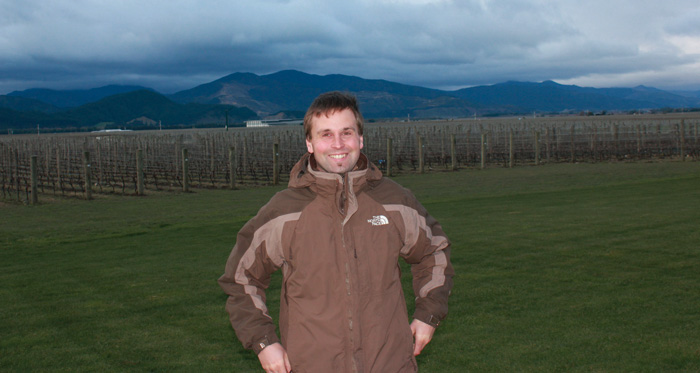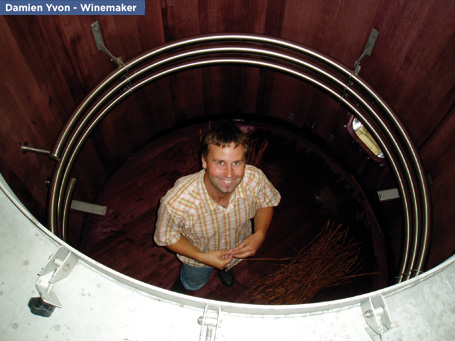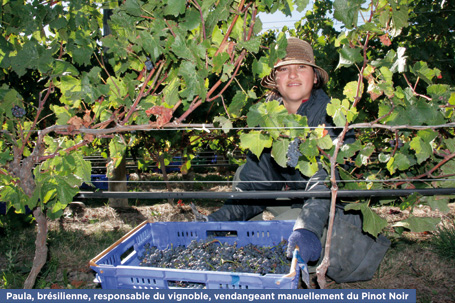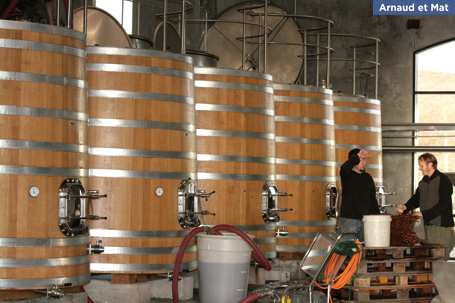World New Zealand
Interview
in New Zealand
Damien Yvon is the manager and cellar master of Clos Henri, the family Bourgeois' estate. Aged 29, he meets success at the other side of the world.

In the heart of the Wairau Valley, in the middle of an ocean of vines, it can be seen from far away. The chapel Sainte-Solange is the symbol of Clos Henri. Important characters of the Sancerre region, the Bourgeois settled in the area of Marlborough in 2000 after having sought for a new land where to export their know-how. So they fell in love at first sight with this spot with a particularly mild climate and that is already known for its high-quality white Sauvignon. It is Damien Yvon, another frenchy, who leads the visit. Native of Chinon in the Touraine region he arrives in 2004 for a training period. Two years later, his oenology degree in hand, he comes back to settle for good. Aged 29 he now is the managing director of Clos Henri and its winemaker, its cellar master.

98 hectares of pasture—a former sheep farm—are bought by the Bourgeois at a period when Marlborough is not yet covered with vines. Having the choice where to settle they did so uphill of the ancient glacial valley sensing they would find there the most promising soils for winegrowing.
“The locals know their land as farmers, not yet as winegrowers” Damien Yvon explains. Respectful of the regional cultural heritage, the Sancerre family buys the chapel Sainte-Solange in a neighbouring village. They move it with a truck and make it their winery:
“A reference to the church of the village of Chavignol.”
Clos Henri
639 State Highway 63 - West Coast Road
RD1 Blenheim 7271 - Marlborough - Nouvelle Zélande
Tél. : +64 3 572 7923 - Fax : +64 3 572 7926
Boite postale :
Post Office Box 535, Blenheim 7240
Marlborough - Nouvelle Zélande

On an unusual terroir—one of the main seismic faults of the country crosses the Clos Henri—with three different soils, it sometimes is necessary to grope.
“For the Kiwis*, the vine has to be green and lush. Our vision of the terroir is on the contrary that it is self-sufficient” Damien Yvon explains.
“We thus make it suffer. To restrict irrigation, we implemented more density and we reduced yields and foliage. We obtain less aromatic wines than most of those from Marlborough but more full-bodied and mineral.”

The climate of the region, one of the sunniest of the country, is another asset. The wind limits humidity and the only harmful insect, a caterpillar, does not resist to gruel of garlic. Ingredients that build the reputation of the domain now recognized for its Sauvignon with citrus and passion fruit aromas, and well-placed in a gastronomic and top-of-the-range niche.
Damien Yvon is sure that
"the perpetuity of viticulture in New Zealand will go through quality. Our terroirs are not made to produce ordinary wine”.*A ‘Kiwi’ is an inhabitant of New-Zealand by reference to the bird of the same name, symbol of the country. François Mazet et Sylvain Mouillardt
 In the heart of the Wairau Valley, in the middle of an ocean of vines, it can be seen from far away. The chapel Sainte-Solange is the symbol of Clos Henri. Important characters of the Sancerre region, the Bourgeois settled in the area of Marlborough in 2000 after having sought for a new land where to export their know-how. So they fell in love at first sight with this spot with a particularly mild climate and that is already known for its high-quality white Sauvignon. It is Damien Yvon, another frenchy, who leads the visit. Native of Chinon in the Touraine region he arrives in 2004 for a training period. Two years later, his oenology degree in hand, he comes back to settle for good. Aged 29 he now is the managing director of Clos Henri and its winemaker, its cellar master.
In the heart of the Wairau Valley, in the middle of an ocean of vines, it can be seen from far away. The chapel Sainte-Solange is the symbol of Clos Henri. Important characters of the Sancerre region, the Bourgeois settled in the area of Marlborough in 2000 after having sought for a new land where to export their know-how. So they fell in love at first sight with this spot with a particularly mild climate and that is already known for its high-quality white Sauvignon. It is Damien Yvon, another frenchy, who leads the visit. Native of Chinon in the Touraine region he arrives in 2004 for a training period. Two years later, his oenology degree in hand, he comes back to settle for good. Aged 29 he now is the managing director of Clos Henri and its winemaker, its cellar master.


